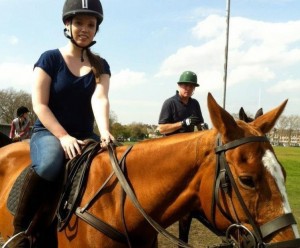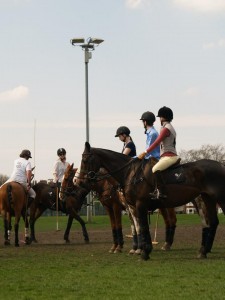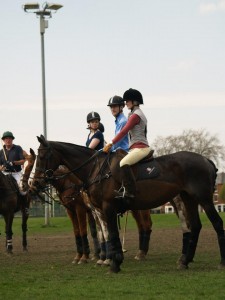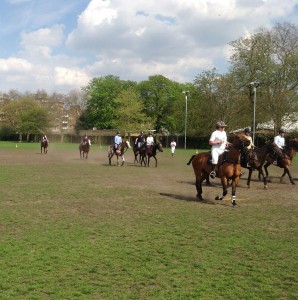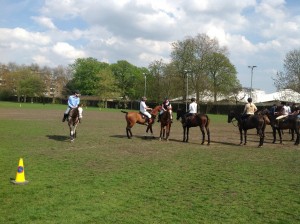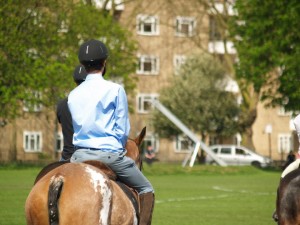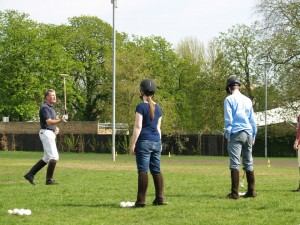Kick Off The Summer Social Season With
MINT Polo in the Park 2013
Be a part of this unique London lifestyle event which blends fashion,
retail and gastronomy with thrilling, high-octane polo.
Where:
Hurlingham Park, Fulham, SW6 3RQ.
Event dates:
7th, 8th & 9th June 2013
Friday 7th June:
City Friday, 12:00 – 21:00 hrs
Saturday 8th June:
Ladies’ Day, 12:00 – 20:00 hrs
Sunday 9th June:
Finals Day, 12:00 – 19:00 hrs
For the fifth consecutive year, Hurlingham Park in Fulham will play host to one of the most hotly anticipated sporting and
social events in London’s calendar; on June 7th, 8th and 9th the hallowed turf will thunder with the hooves of world class
polo ponies. Enjoy a day of entertainment at the spiritual home of polo, which is conveniently located in central London.
On the field, teams from around the globe will compete to be crowned champions of MINT Polo in the Park 2013.
This year’s event will guarantee a quintessentially British atmosphere fused with the truly international flavour of the
sport, with the four corners of the globe being represented by IG Index Team Sydney, Mandarin Oriental Team Beijing,
Otkritie Team Moscow, City AM Team Abu Dhabi and the ever-popular Camino Real Team Buenos Aires, plus the home
team and 2012 Champions, MINT Team London. It is the perfect way to kick off the summer social season with friends,
family, clients or colleagues.
Eat, drink, shop, socialise, enjoy world-class hospitality and see thrilling polo with the thousands of guests who return
year after year to this multi award-winning event.
Winner of the 2010 and 2011 London Sport Attraction of the Year at The London Lifestyle Awards, MINT Polo in the Park
is the leading outdoor polo and lifestyle event in Central London. It is regarded highly for its innovative format and
provides the perfect introduction for those less well-acquainted with the sport.
2013 Features
We are delighted to announce a range of off-field features, entertainment and hospitality areas. Some are brand new
additions to the event and others are the welcome return of favourites from previous years.
KERB Food Market
KERB Food Market is a new pitch-side addition which offers an abundance of fresh produce from Britain and abroad.
Providing variety and great value food, KERB gives you the opportunity to sample some of the finest fresh produce and
delicious summer party favourites throughout the three-day event.
The Pommery Champagne Garden
The Pommery Champagne Garden gives spectators first-class service and spectacular views of the polo. Relax on the
deck chairs, challenge your friends to a game of table football or simply sit back in the salubrious surroundings and sip
on a glass of vintage Pommery.
Mahiki
2013 sees the return of London’s premier nightclub, which will take pride of place and offer some of the best pitch-side
views of the polo action. Renowned as one of the places to be in on the capital’s social scene, Mahiki blends a
Polynesian ambiance with chic luxury London living.
Crown & Corgi Pub
A proper British pub is clearly an important addition to such a quintessentially British sporting and social event. The
Crown & Corgi provides a fantastic vantage point from which to get close to the on-field action. In addition the bar has
been extended from last year so that you can spend less time ordering drinks and more time enjoying them.
The PIMM’S Bus
The iconic double decker bus will provide the centre piece of the white picket fenced PIMM’s garden. Their expert
mixologists provide you with possibly the most revered and established summer party beverage, which no British social
occasion would be complete without. Recline on the deck chairs and soak up the very best of British.
CLUBHOUSE
Stella Artois is proud to be the Official Lager Supplier to MINT Polo in the Park 2013.
Guests are invited to visit the Stella Artois Clubhouse which will embody the upmost sophistication and where master
draftsmen will serve chalices of perfectly poured Stella Artois; introducing them to the discerning style and authenticity
of the brand.
The KERB food market
KERB are a centrally organised community of independent ‘Street-Food’ vendors. They have a strict vetting process
based on the highest levels of product, sourcing, health and hygiene, as well as style and originality. KERB are well
known in both the ‘foodie’ and ‘trendy’ circles of London for their phenomenal variety and world famous burgers.
Luxury Shopping Village
Featuring over 40 exhibitors selling a wide range of quality products, the Luxury Shopping Village is a wonderful
showcase of products you might not find on the high street. From hats to Argentine leather goods and bespoke
jewellery to exquisite works of art and some of the finest accessories for town and country, our retailers are ready to
help you find that extra special souvenir of your day.
Club Med Kids
As the leading family travel organiser, Club Med have joined us to ensure all members of the family are kept entertained
at MINT Polo in the Park. Our extended and improved Kids’ Zone reflects a truly family-friendly event which caters for
parents and children alike. The secure, supervised area will feature soft play, face painting, ball pools, competitions and
music. The Club Med Kids’ Zone means that you can bring the entire family for a great day out with us.
Finals Day (Sun 9th June)
In addition to the weekend-long Club Med Kids’ Zone, Sunday 9th June will see not only the mounting tension of the
polo as the teams progress towards the final, but also a range of on-field entertainment between matches catering for
children of all ages. In addition to this, exclusively on Finals Day we will be running a range of on-field activities
especially for children. These activities will be free and will run from Midday until 1.45pm offering a great start to any
child’s day out. On-field activities will include a giant inflatable slide, relay races, British Bulldog and dodgeball run by
our partner charity, Walking With The Wounded. We will also have children’s entertainers circulating within the crowd
throughout the day, providing the ultimate family experience.
Charity Work
MINT Polo in the Park is delighted to announce that Walking with the Wounded will return as the official charity partner
for MINT Polo in the Park 2013. Walking with the Wounded raises money to fund the training of wounded service
personnel so that they are equipped with the skills and qualifications required to find long-term employment and create
secure futures for themselves and their families. Later this year Walking With The Wounded South Pole Allied Challenge
2013 will see teams of wounded servicemen and women from the four corners of the globe race across the Antarctic.
Ticket Packages
MINT Polo in the Park brings polo from its traditional home in the counties to the heart of London and our ticketing
packages are tailored to suit a range of requirements. Bookings for individual and group tickets are made via
Ticketmaster on 0844 248 5069.
General Admission
Enjoy the event with the ability to roam around all public areas of the venue.
Grandstand Tickets
In addition to access to the venue at ground level, this pass allows you access to the Grandstand for the seats with the
best views of the action. Purchasing a Grandstand Ticket means your seat will be allocated exclusively to you.
Family & Groups
Share the experience with friends and family by taking advantage of our family and group discounts.
– Family Ticket includes two adults and two children.
– Groups of 10-20 people: Save 10%
– Groups of 21-30 people: Save 15%
– Groups of 31 or over: Save 20%
VIP Hospitality at The Hurlingham Club
Enjoy luncheon at one of the UK’s most prestigious members’ club, its history inextricably linked to the history of polo.
Walk through the beautiful 42-acre garden following lunch to the private pitch-side Hurlingham Club Enclosure where
you will enjoy our hospitality and fantastic views of the polo. Please contact Rachel at City Events on 0207 936 5284 or
VIP Hospitality at Hurlingham Park
Polo and social entertaining go hand-in-hand so if you have a summer celebration, are organising a group visit or wish
to entertain clients or colleagues then these private, staffed marquees are perfect for your event.
Pricing
Friday 7th June
General Admission (no restriction on access to the Grandstand on Friday ONLY)
Adult
£20
(£5 after 5pm)
Child
£10
(free after 5pm)
Family
£60
Saturday 8th June
Grandstand
Adult
£45
Child
£15
Family
£110
General Admission
Adult
£35
Child
£15
Family
£75
Sunday 9th June
Grandstand
Adult
£40
Child
£10
Family
£80
General Admission
Adult
£25
Child
£10
Family
£60
Find more about MINT Polo in the Park
PoloInTheParkLondon.com | Facebook.com/PoloInThePark | @PoloInThePark
Tickets
Ticketmaster
0844 248 5069
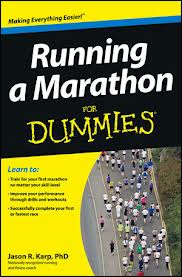 Marathons are hugely popular now. It seems everyone I know is doing one. Although I have yet to join in, this book has made me feel inspired. Unfortunately injuries are rife as people underestimate just how hard it is. Enter Running A Marathon For Dummies. An incredibly informative book which covers everything you could possibly want to know about running a marathon.
Marathons are hugely popular now. It seems everyone I know is doing one. Although I have yet to join in, this book has made me feel inspired. Unfortunately injuries are rife as people underestimate just how hard it is. Enter Running A Marathon For Dummies. An incredibly informative book which covers everything you could possibly want to know about running a marathon.
